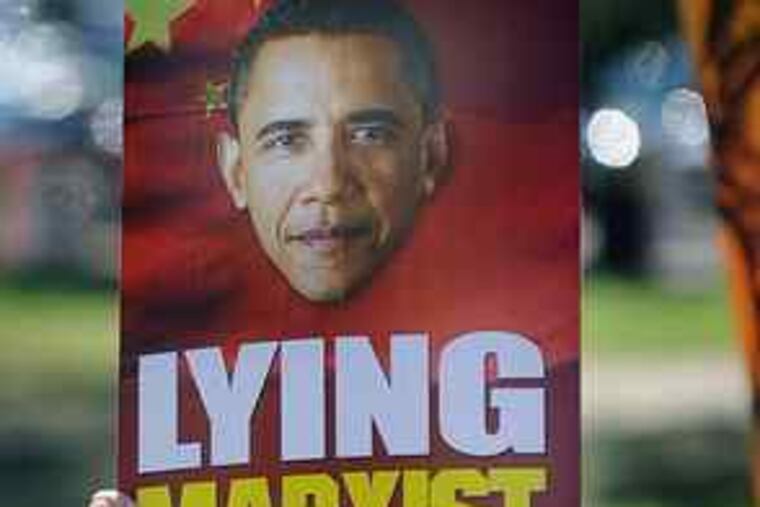Forces lining up against Democrats in '10
WASHINGTON - Three forces threaten Democrats in the 2010 elections: populist anger on the right, disaffection in the middle, and potential disillusionment on the left.

WASHINGTON - Three forces threaten Democrats in the 2010 elections: populist anger on the right, disaffection in the middle, and potential disillusionment on the left.
Little more than a year out, the political landscape for the coming midterm election looks decidedly more favorable for Republicans than in either of the last two elections - hardly a surprise given the shellacking they took in 2006 and 2008. Whether their expectations for 2010 are met or exceeded, however, depends on the confluence of the political forces that have been building since President Obama's inauguration.
Today, Republicans expect gains across the board. As Republican pollster Neil Newhouse put it: "In the last two election cycles, our candidates have been campaigning into the wind. Assessing the political environment right now, it sure looks like we're going to have a nice little breeze at our back."
But strategists aren't certain whether that breeze will turn into a political gale. Whatever problems Obama and the Democrats are having, Republicans aren't wildly popular either. Former House Speaker Newt Gingrich, who helped engineer the 1994 GOP victory, offered an astute analysis when asked to compare the climate today with conditions heading into 1994.
"People are more frightened than they were in '93 and '94. Both by the radicalism of the administration and by the economy," Gingrich said. But he added, "They're more skeptical of Republicans than they were in '93 and '94. The aftereffect of '06 and '08 is there's not a rush to Republicans."
The most demonstrable political uprising of the last few months has been the populist anger seen at town-hall meetings during the August congressional recess and expressed through conservative talk radio, television, and blogs.
One likely effect of it will be to boost conservative turnout and produce an electorate potentially quite different than in 2008.
There are aspects of this movement that could dampen the potential benefits for Republicans. One is the Perot-like quality to some of the protests, which is to say that some of the anger among these Americans is aimed at both parties and at Washington, rather than just at Obama. Republicans were skillful in 1993-94 in catering to the Ross Perot voters. But Republican leaders today cannot automatically count on all the angry populists to enthusiastically support them.
Some of the loudest voices on the right are virulently anti-Obama and see the world in starkly different terms than much of the rest of the electorate. The Democracy Corps, a liberal organization headed by Democrats Stan Greenberg and James Carville, sponsored focus groups among very conservative Republicans and concluded: "The Republican base voters are not part of the continuum leading to the center of the electorate: they truly stand apart."
Channeling the anger on the right in a way that doesn't turn off voters in the center will be one of the GOP's challenges.
Possible disaffection among independent voters may be even more critical in shaping the 2010 political landscape. "Right now, I believe we as Democrats must be most concerned about disaffection in the middle," strategist Tad Devine said. "Middle-class voters put their faith in our party and its leaders in the last two elections, and that faith needs to be vindicated by concrete results."
Independent voters were instrumental in giving Democrats their victories in 2006 and '08. Over the summer, they shifted away from Obama. His approval rating in June among independents was 65 percent, according to a Washington Post-ABC News poll. By September, just 49 percent of independents approved of the job he was doing.
Economic insecurity, fears about the growth of government spending and the size of the deficit, confusion about health care, and a concern that Obama has tried to do too much too quickly have added to independents' erosion in confidence.
Finally, Obama risks disillusionment on the left in two areas: One is health care, where progressives have mounted a campaign to make certain a public option is included in any final legislation.
There is greater potential for disillusionment on the left over Afghanistan. Obama is nearing a decision on whether to substantially increase the number of U.S. forces there. Progressives oppose a big increase in troops and an open-ended commitment.
A backlash on the left could mean lower Democratic turnout in the midterm elections.
Democrats know they need things to change, whether an economic rebound, enactment of a health-care bill that proves economically popular, or a brighter forecast for Afghanistan. Those are all big variables, which is why Democrats begin the 2010 cycle on the defensive.